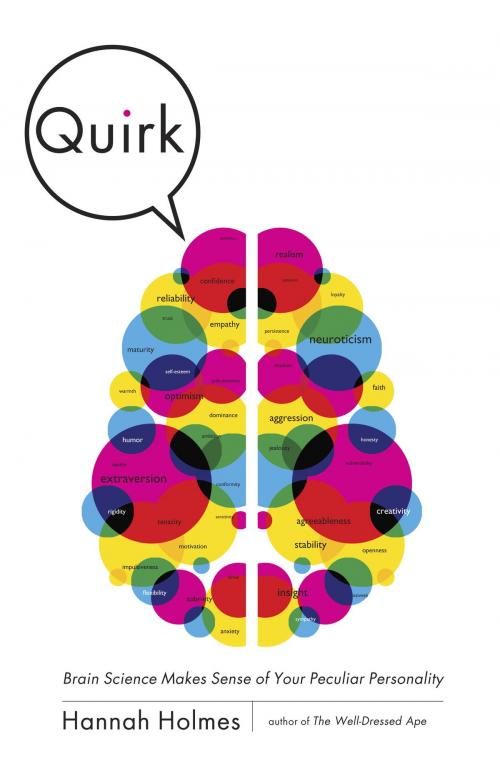Quirk
Brain Science Makes Sense of Your Peculiar Personality
Nonfiction, Science & Nature, Science, Biological Sciences, Biology, Other Sciences, History, Social & Cultural Studies, Social Science, Cultural Studies, Popular Culture| Author: | Hannah Holmes | ISBN: | 9780679604525 |
| Publisher: | Random House Publishing Group | Publication: | February 22, 2011 |
| Imprint: | Random House | Language: | English |
| Author: | Hannah Holmes |
| ISBN: | 9780679604525 |
| Publisher: | Random House Publishing Group |
| Publication: | February 22, 2011 |
| Imprint: | Random House |
| Language: | English |
Who are you? It’s the most fundamental of human questions. Are you the type of person who tilts at windmills, or the one who prefers to view them from the comfort of an air-conditioned motorcoach? Our personalities are endlessly fascinating—not just to ourselves but also to our spouses, our parents, our children, our co-workers, our neighbors. As a highly social species, humans have to navigate among an astonishing variety of personalities. But how did all these different permutations come about? And what purpose do they serve?
With her trademark wit and sly humor, Hannah Holmes takes readers into the amazing world of personality and modern brain science. Using the Five Factor Model, which slices temperaments into the major factors (Extraversion, Neuroticism, Agreeableness, Conscientiousness, and Openness) and minor facets (such as impulsive, artistic, or cautious), Holmes demonstrates how our genes and brains dictate which factors and facets each of us displays. Are you a Nervous Nelly? Your amygdala is probably calling the shots. Hyperactive Hal? It’s all about the dopamine.
Each facet took root deep in the evolution of life on Earth, with Nature allowing enough personal variation to see a species through good times and bad. Just as there are introverted and extroverted people, there are introverted and extroverted mice, and even starfish. In fact, the personality genes we share with mice make them invaluable models for the study of disorders like depression, schizophrenia, and anxiety. Thus it is deep and ancient biases that guide your dealings with a very modern world. Your personality helps to determine the political party you support, the car you drive, the way you eat M&Ms, and the likelihood that you’ll cheat on your spouse.
Drawing on data from top research laboratories, the lives of her eccentric friends, the conflicts that plague her own household, and even the habits of her two pet mice, Hannah Holmes summarizes the factors that shape you. And what she proves is that it does take all kinds. Even the most irksome and trying personality you’ve ever encountered contributes to the diversity of our species. And diversity is the key to our survival.
Who are you? It’s the most fundamental of human questions. Are you the type of person who tilts at windmills, or the one who prefers to view them from the comfort of an air-conditioned motorcoach? Our personalities are endlessly fascinating—not just to ourselves but also to our spouses, our parents, our children, our co-workers, our neighbors. As a highly social species, humans have to navigate among an astonishing variety of personalities. But how did all these different permutations come about? And what purpose do they serve?
With her trademark wit and sly humor, Hannah Holmes takes readers into the amazing world of personality and modern brain science. Using the Five Factor Model, which slices temperaments into the major factors (Extraversion, Neuroticism, Agreeableness, Conscientiousness, and Openness) and minor facets (such as impulsive, artistic, or cautious), Holmes demonstrates how our genes and brains dictate which factors and facets each of us displays. Are you a Nervous Nelly? Your amygdala is probably calling the shots. Hyperactive Hal? It’s all about the dopamine.
Each facet took root deep in the evolution of life on Earth, with Nature allowing enough personal variation to see a species through good times and bad. Just as there are introverted and extroverted people, there are introverted and extroverted mice, and even starfish. In fact, the personality genes we share with mice make them invaluable models for the study of disorders like depression, schizophrenia, and anxiety. Thus it is deep and ancient biases that guide your dealings with a very modern world. Your personality helps to determine the political party you support, the car you drive, the way you eat M&Ms, and the likelihood that you’ll cheat on your spouse.
Drawing on data from top research laboratories, the lives of her eccentric friends, the conflicts that plague her own household, and even the habits of her two pet mice, Hannah Holmes summarizes the factors that shape you. And what she proves is that it does take all kinds. Even the most irksome and trying personality you’ve ever encountered contributes to the diversity of our species. And diversity is the key to our survival.















